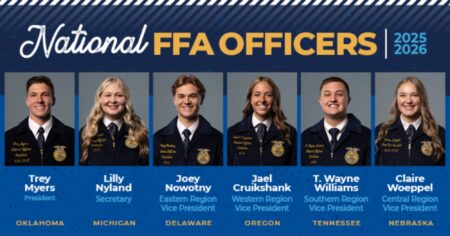By Cami Koons
Iowa Rep. J.D. Scholten, D-Sioux City, said Iowa farmers are “hurting” and that the “status quo is not working” as he offered farm policies he would push for if elected to the U.S. Senate.
Scholten’s policies, discussed Monday at Griffieon Family Farm outside of Ankeny, a Des Moines suburb, are aimed at improving competition in the agriculture sector, funding conservation efforts and supporting regional food systems.
The agriculture sector is in a recession even “before tariffs — this is just the way the industry is working right now,” Scholten said.
According to the latest U.S. Bureau of Economic Analysis, real gross domestic product declined in Iowa by 6.1% in the first quarter of 2025, and agriculture was the leading contributor to the decline.
Scholten said marketplace consolidation has hurt not just family farms but the whole sector. As an example, he held up a sign with a breakdown of the top four U.S. meatpacking companies — Tyson, JBS, National Beef and Cargill — and all the meat companies they own.
“When you go to the grocery store, you think you have all these options,” Scholten said. “But … it’s owned by just a couple.”
He said a lack of solid competition “squeezes” farmers and consumers. While the meat industry is a good example of consolidation, Scholten said everything from seed, to railroads, to fertilizer, and even tractors are consolidated beyond the levels considered a monopoly.
Scholten said the federal Farm Bill should address these issues along with increased oversight from the Federal Trade Commission and the federal Justice Department. He said his farm policy objectives also include stopping future ag mergers, reforming the Packers and Stockyards Act, requiring country-of-origin labeling, and stopping foreign ownership of agricultural land.
Cami Koons/Iowa Capital Dispatch
The Farm Bill is traditionally bipartisan legislation, typically reauthorized every five years to lay out agriculture, federal nutrition programs, and rural development budgets. The bill was reauthorized last in 2018 and has been extended the past two years.
Tony Thompson, who grows produce northeast of Des Moines, said these issues affect Iowans in “many ways” including the prices at the grocery store, the wages a company pays as a living wage, and the quality of the water in the tap.
“We talk about the value of feeding the world, and we don’t really feed ourselves,” Thompson said. “We talk about the value of farm families and rural communities, but we’re doing everything from a policy standpoint that essentially undermines that.”
According to a case study from Iowa State University, more than 90% of table food consumed in Iowa is brought it in from other places.
Scholten said it is also important to carve out funding in the farm bill and other farm policies for conservation efforts that protect water quality and the environment. He noted the importance of providing adequate funding to initiatives such as the Environmental Quality Incentives Program and the Conservation Reserve Program that incentivize farmers to implement practices including cover crops and rotational grazing.
As an example of programs helping to support regional food systems, Scholten, Thompson, and Griffieon, who helped host the event, mentioned programs such as the Local Food for Schools funding which was cut early in the new administration. This program helped schools purchase goods from local farmers and gave regional food producers a stable market for which to sell.
More nutritious, local food has also been a priority in the Republican Party. Lawmakers introduced bills in Iowa to change school and federal nutrition assistance programs to make them healthier. At a national level, the Make America Healthy Again initiative is pushing for a removal of food dyes, ultraprocessed foods and additives from Americans’ diet.
Scholten said there is “overlap” between this GOP initiative and what he believes needs to happen in the agriculture sector.
“There’s opportunity to work across the aisle on this, and I hope that becomes more of a theme,” Scholten said.
Scholten said that while President Donald Trump likes to say that “farmers love him,” there are farmers who have had their contracts from the USDA cut; soybean farmers who lost a share of the market during the trade war of Trump’s first term; farmers paying for tariffs on inputs; and others being beaten out of the consolidated market.
“We’re selling out rural America,” Scholten said. “What we’re laying out here is an opportunity to fight back.”
Scholten is one of several Democrats seeking the nomination, including Nathan Sage and Zach Wahls. Sen. Joni Ernst has not announced whether she is seeking a second term but one other Republican, Jim Carlin, is in the race.
Iowa Capital Dispatch is part of States Newsroom, a network of news bureaus supported by grants and a coalition of donors as a 501c(3) public charity. Iowa Capital Dispatch maintains editorial independence. Contact Editor Kathie Obradovich for questions: [email protected]. Follow Iowa Capital Dispatch on Facebook and Twitter.



:max_bytes(150000):strip_icc()/52513708671_2a6075fabe_o-dcd59efb1faf4c40afb3d8f39629aa7d.jpg)
:max_bytes(150000):strip_icc()/JaceYoung-ee4a04deb5fe4fbfa816744f027fcda5.jpg)


:max_bytes(150000):strip_icc()/IMG_9749-2048x1365-7abe031520a74b23951ee41e81684191.jpg)

:max_bytes(150000):strip_icc()/pumpkins-_-cami-koons-2048x1545-b706ebeeace44615adaef29ad2c99f39.jpg)
:max_bytes(150000):strip_icc()/1-89ea904b07704f62a53279adb3db52b3.jpg)
